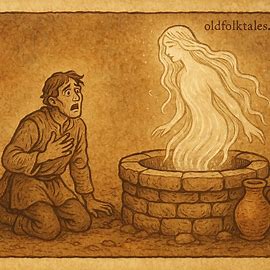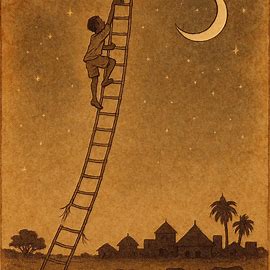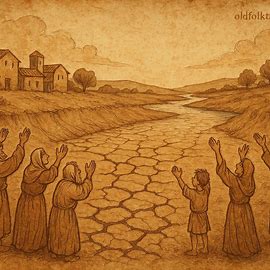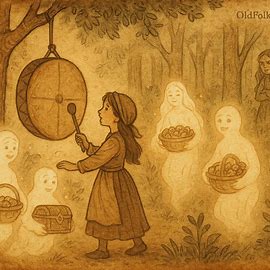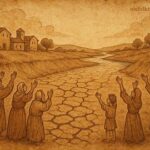In the heat of the Sudanese plains, where the earth cracked under the sun and water was a treasure drawn from deep places, there stood an old stone well. For generations, villagers had lowered their clay jars into its cool depths, pulling up the life-giving water that sustained families, fields, and animals alike. It was said to be one of the oldest wells in the region, carved long before memory, and whispered to hold mysteries beneath its dark surface.
One day, a man came alone to this ancient well. His jar clinked against the rope as he lowered it carefully, the sound echoing faintly from the hollow chamber below. With steady hands he pulled the vessel back up, heavy with water, and set it down beside him. As he bent to lift it, a voice rose from the depths, strange, hollow, and echoing.
“Give me to drink,” it called, “and I will grant you a wish.”
The man froze. His heart pounded, for he knew wells were sometimes said to be dwelling places of spirits. Fear gripped him, yet curiosity pulled stronger. Gathering courage, he tipped the jar back into the darkness, letting the water splash once more into the hidden chamber below.
From the shadowed depths, a spirit rose. Shimmering, neither man nor beast, it hovered above the stones, its voice carrying power. “You have given,” it said. “Now choose your desire.”
The man, though still trembling, could not resist the offer. He had long envied those who filled their homes with the laughter of many children. So he spoke without hesitation: “Grant me many sons.”
READ THIS: The Eagle and the Tortoise: A Sudanese Folktale That Teaches Lessons on Wisdom and Patience
The spirit inclined its head. “So be it.” Then it sank back into the well, vanishing into silence.
Seasons turned, and the man’s wish came to life. His household grew with astonishing swiftness. One child, then another, and soon a line of sons filled his home, ten in all, strong and lively. Their voices echoed through the village, their feet pattered across the dusty earth, and their presence brought pride to their father.
At first, he rejoiced. He looked upon his ten sons as proof of fortune, a gift that set him above others. Neighbors admired his household, and his heart swelled with pride. Yet blessings can turn to burdens, and the joy of many mouths soon gave way to hunger.
For the man was not rich. His land was meager, his harvests uncertain, and his hands could not stretch wide enough to provide for all. The more his sons grew, the greater their needs became. Bread was never enough, meat was scarce, and the laughter of his children was often drowned by cries of hunger.
Day after day, the man struggled. His back ached from laboring in the fields, yet his basket never held enough grain. At night, he lay awake listening to the restless stirrings of his children, their hunger gnawing not only at their bellies but also at his spirit.
The pride he once felt faded into sorrow. He remembered the day at the well, the voice of the spirit, and his own unthinking request. At last, unable to bear the burden, he returned to the old stone well.
Standing once more at its edge, he lowered his jar, pulled it back, and poured the water down as before. The spirit rose again, its presence shimmering in the air.
“What troubles you, man?” it asked, its voice low and echoing.
The man fell to his knees. “I asked for many sons, and you granted my wish. But I am poor. I cannot feed them. Their hunger is my torment. Take them back, I beg you.”
The spirit regarded him with eyes like shadowed pools. Its voice was steady, neither cruel nor kind. “What you wish, you must bear. A gift once given cannot be undone. You asked for many children, and now they are yours. Their hunger is not mine but yours to answer.”
With that, the spirit faded once more into the darkness of the well. The man remained alone, bowed beneath the weight of his choice. His plea had gone unanswered, for the responsibility of a wish, once made, could not be surrendered.
Moral Lesson
This Sudanese folktale teaches that desire without foresight can become a burden. The man longed for many children, believing that numbers alone would bring him joy. Yet he failed to consider the responsibility of providing for them. His wish, once fulfilled, became his trial.
The story reminds us that every blessing carries weight. When we seek more than we can sustain, our wishes may transform into chains. True wisdom lies in asking not only for what we want but for what we can carry with strength and care.
Knowledge Check
Q1: Where did the man encounter the spirit in this Sudanese folktale?
In an old stone well, while drawing water.
Q2: What promise did the spirit make to the man?
That if he gave water, it would grant him a wish.
Q3: What did the man wish for?
He wished for many children, specifically many sons.
Q4: How many sons did the man eventually have?
He had ten sons, lively but hungry.
Q5: Why did the man regret his wish?
Because he was poor and could not feed or provide for so many children.
Q6: What was the spirit’s final response when asked to take back the children?
It said, “What you wish, you must bear,” refusing to undo the man’s choice.
Source: Sudanese folktale (collected among the Bagara Arabs, Arabized Kordofanese tradition, by Frobenius, 1923).
